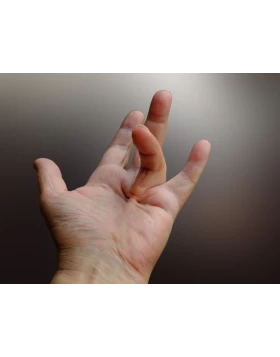Thumb Ulnar Collateral Ligament Injury
Our service offers comprehensive treatment for ulnar collateral ligament injury, a common condition that affects the stability and functionality of the thumb. This ligament, vital to maintaining the integrity of the thumb, is prone to injury, often resulting from excessive abduction of the finger during activities such as sports or accidents. This injury requires immediate attention to prevent long-term instability and loss of hand function.
For partial tears and nondisplaced bony comminution fractures, conservative treatment includes immobilizing the thumb for 4-6 weeks, followed by gradual return to sports activities. Complete tears require surgery, which includes suturing the ligament, reattaching it to the bone using intraosseous anchors, or repositioning the bone to its anatomic location using osteosynthesis materials as appropriate.
Our team prioritizes the patient's well-being, complete guidelines, and the subsequent physical rehabilitation program needed for optimal and smooth recovery of the thumb. With our expertise, patients can regain thumb function and resume daily activities with confidence.

Do you have additional questions about the service?
What are the symptoms of a ulnar collateral ligament injury of the thumb?
Symptoms may include pain, swelling and bruising on the medial side of the thumb. There may also be unsteadiness or weakness in catching objects.
How is the surgery done? Is hospitalization required?
The surgery is performed under local anesthesia and no hospitalization is required.
How long does recovery take after surgery?
After the surgery, you need to keep the hand still for six weeks. A physical rehabilitation program is followed to avoid post-traumatic stiffness. After three months, free use of the hand is allowed.
What are the possible complications?
Surgical complications are rare. Some possible complications are: hematoma, surgical wound infection, ligament tear, post-traumatic stiffness


 Ελληνικά
Ελληνικά




